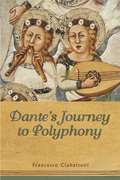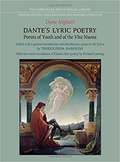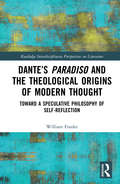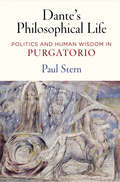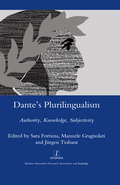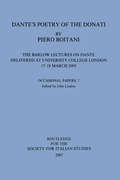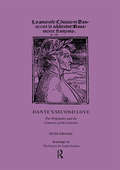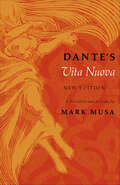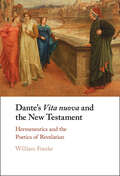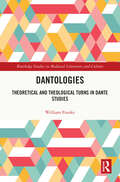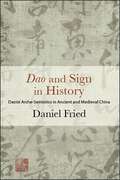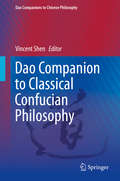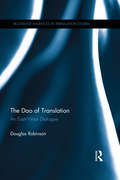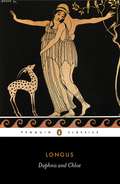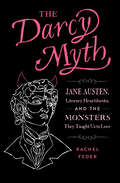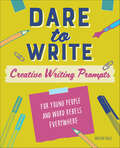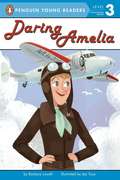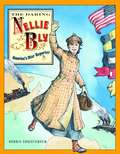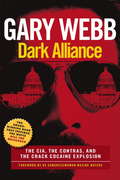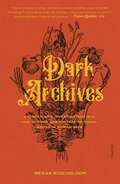- Table View
- List View
Dante's Journey to Polyphony
by Francesco CiabattoniIn Dante's Journey to Polyphony, Francesco Ciabattoni's erudite analysis sheds light on Dante's use of music in the Divine Comedy. Following the work's musical evolution, Ciabattoni moves from the cacophony of Inferno through the monophony of Purgatory, to the polyphony of Paradise and argues that Dante's use of sacred songs constitutes a thoroughly planned system. Particular types of music accompany the pilgrim's itinerary and reflect medieval theories regarding sound and the sacred. Combining musicological and philological scholarship, this book analyzes Dante's use of music in conjunction with the form and content of his verse, resulting in a cross-discipline analysis also touching on Italian Studies, Medieval Studies, and Cultural History. After moving from infernal din to heavenly harmony, Ciabattoni's final section addresses the music of the spheres, a theory that enjoyed great diffusion among the early middle ages, inspiring poets and philosophers for centuries.
Dante's Lyric Poetry: Poems of Youth and of the 'Vita Nuova' (Lorenzo Da Ponte Italian Library)
by Richard Lansing Teodolinda Barolini Andrew FrisardiThe first comprehensive English translation and commentary on Dante's early verse to be published in almost fifty years, Dante's Lyric Poetry includes all the poems written by the young Dante Aligheri between c. 1283 and c. 1292. Essays by Teodolinda Barolini guide the reader through the new verse translations by Richard Lansing, illuminating Dante's transformation from a young courtly poet into the writer of the vast and visionary Commedia.Barolini's commentary exposes Dante's lyric poems as early articulations of many of the ideas in the Commedia, including the philosophy and psychology of desire and its role as motor of all human activity, the quest for vision and transcendence, the frustrating search for justice on earth, and the transgression of boundaries in society and poetry. A wide-ranging and intelligent examination of one of the most important poets in the Western tradition, this book will be of interest to scholars and poetry-lovers alike.
Dante’s Paradiso and the Theological Origins of Modern Thought: Toward a Speculative Philosophy of Self-Reflection (Routledge Interdisciplinary Perspectives on Literature)
by William FrankeSelf-reflection, as the hallmark of the modern age, originates more profoundly with Dante than with Descartes. This book rewrites modern intellectual history, taking Dante’s lyrical language in Paradiso as enacting a Trinitarian self-reflexivity that gives a theological spin to the birth of the modern subject already with the Troubadours. The ever more intense self-reflexivity that has led to our contemporary secular world and its technological apocalypse can lead also to the poetic vision of other worlds such as those experienced by Dante. Facing the same nominalist crisis as Duns Scotus, his exact contemporary and the precursor of scientific method, Dante’s thought and work indicate an alternative modernity along the path not taken. This other way shows up in Nicholas of Cusa’s conjectural science and in Giambattista Vico’s new science of imagination as alternatives to the exclusive reign of positive empirical science. In continuity with Dante’s vision, they contribute to a reappropriation of self-reflection for the humanities.
Dante's Philosophical Life: Politics and Human Wisdom in "Purgatorio"
by Paul SternWhen political theorists teach the history of political philosophy, they typically skip from the ancient Greeks and Cicero to Augustine in the fifth century and Thomas Aquinas in the thirteenth, and then on to the origins of modernity with Machiavelli and beyond. Paul Stern aims to change this settled narrative and makes a powerful case for treating Dante Alighieri, arguably the greatest poet of medieval Christendom, as a political philosopher of the first rank.In Dante's Philosophical Life, Stern argues that Purgatorio's depiction of the ascent to Earthly Paradise, that is, the summit of Mount Purgatory, was intended to give instruction on how to live the philosophic life, understood in its classical form as "love of wisdom." As an object of love, however, wisdom must be sought by the human soul, rather than possessed. But before the search can be undertaken, the soul needs to consider from where it begins: its nature and its good. In Stern's interpretation of Purgatorio, Dante's intense concern for political life follows from this need, for it is law that supplies the notions of good that shape the soul's understanding and it is law, especially its limits, that provides the most evident display of the soul's enduring hopes.According to Stern, Dante places inquiry regarding human nature and its good at the heart of philosophic investigation, thereby rehabilitating the highest form of reasoned judgment or prudence. Philosophy thus understood is neither a body of doctrines easily situated in a Christian framework nor a set of intellectual tools best used for predetermined theological ends, but a way of life. Stern's claim that Dante was arguing for prudence against dogmatisms of every kind addresses a question of contemporary concern: whether reason can guide a life.
Dante's Plurilingualism: Authority, Knowledge, Subjectivity
by Sara FortunaDante's conception of language is encompassed in all his works and can be understood in terms of a strenuous defence of the volgare in tension with the prestige of Latin. By bringing together different approaches, from literary studies to philosophy and history, from aesthetics to queer studies, from psychoanalysis to linguistics, this volume offers new critical insights on the question of Dantes language, engaging with both the philosophical works characterized by an original project of vulgarization, and the poetic works, which perform a new language in an innovative and self-reflexive way. In particular, Dantes Plurilingualism explores the rich and complex way in which Dantes linguistic theory and praxis both informs and reflects an original configuration of the relationship between authority, knowledge and identity that continues to be fascinated by an ideal of unity but is also imbued with a strong element of subjectivity and opens up towards multiplicity and modernity.
Dante's Poetry of Donati: The Barlow Lectures on Dante Delivered at University College London, 17-18 March 2005
by Piero Boitani"Members of the Florentine family of the Donati feature prominently in Dante's Divine Comedy . Their presence is explored by Piero Boitani, as a 'comedy' within the Comedy, in close readings of the three major episodes in which they appear, one for each of Inferno , Purgatorio , and Paradiso ."
Dante's Second Love: The Originality and the Contexts of the Convivio
by Peter Dronke"Three essays on the nature of the bonds between Vita Nuova and Convivio; the nature and significance of the Donna Gentile, Dante's 'second love'; and the imaginative and intellectual coherence of the third and fourth treatises of the Convivio . An excursus comments on the Donna Gentile's fate at the hands of scholars."
Dante's Tenzone with Forese Donati
by Fabian Alfie'And by now, mind, it's too late to redeem your debts by giving up guzzling.' Dante's poetic correspondence (or tenzone) with Forese Donati, a relative of his wife, was rife with crude insults: the two men derided one another on topics ranging from sexual dysfunction and cowardice to poverty and thievery. But in his Commedia, rather than denying this correspondence, Dante repeatedly acknowledged and evoked the memory of his youthful put-downs.Dante's Tenzone with Forese Donati examines the lasting impact of these sonnets on Dante's writings and Italian literary culture, notably in the work of Giovanni Boccaccio. Fabian Alfie expands on derision as an ethical dimension of medieval literature, both facilitating the reprehension of vice and encouraging ongoing debates about the true nature of nobility. Outlining a broad perspective on the uses of literary insult, Dante's Tenzone with Forese Donati also provides an evocative glimpse of Dante's day-to-day life in the twelfth century.
Dante's Vita Nuova: A Translation and an Essay
by Dante AlighieriIn this new edition Musa views Dante's intention as one of cruel and comic commentary on the shallowness and self-pity of his protagonist, who only occasionally glimpses the true nature of love. ". . . the explication de texte which accompanies [Musa's] translation is instructively novel, always admirable. . . . This present work offers English readers a lengthy appraisal which should figure in future scholarly discussions." —Choice
Dante's Vita Nuova and the New Testament: Hermeneutics and the Poetics of Revelation
by William FrankeModelling knowledge as revelation and theology as poetry, this powerful new reading of the Vita nuova not only challenges Dante scholars to reconsider the book's speculative emphases but also offers the general reader an accessible yet penetrating exploration of some of the Western tradition's most far-reaching ideas surrounding love and knowledge. Dante's 'little book', included in full here in an original parallel translation, captures in its first emergence the same revolutionary ferment that would later become manifest both in the larger oeuvre of this great European writer and in the literature of the entire Western canon. William Franke demonstrates how Dante's youthful poetic autobiography disrupts sectarian thinking and reconciles the seeming contraries of divine revelation and human invention, while also providing the means for understanding religious revelation in the Bible. Ultimately, this revolutionary unification of Scripture and poetry shows the intimate working of love at the source of inspired knowing.
Dantologies: Theoretical and Theological Turns in Dante Studies
by William FrankeThis book comprises a searching philosophical meditation on the evolution of the humanities in recent decades, taking Dante studies as an exemplary specimen. The contemporary currents of theory have decisively impacted this field, but Dante also has a strong relationship with theology. The idea that theology, teleology, and logocentric rationalities are simply overcome and swept away by new theoretical approaches proves much more complex as the theory revolution is exposed in its crypto-theological motives and origins. The revolutionary agendas and methodologies of theoretical currents have ushered in all manner of minorities and postcolonial and gender studies. But the exciting adventure they inaugurate shows up in quite a surprising light when brought to focus through the scholarly discipline of Dante studies as a terrain of dispute between traditional philology and postmodern theory. On this terrain, negative theology can play a peculiarly destabilizing, but also a conciliatory, role: it is equally critical of all languages for a theological transcendence to which it nevertheless remains infinitely open.
Dao and Sign in History: Daoist Arche-Semiotics in Ancient and Medieval China (SUNY series in Chinese Philosophy and Culture)
by Daniel FriedFrom its earliest origins in the Dao De Jing, Daoism has been known as a movement that is skeptical of the ability of language to fully express the truth. While many scholars have compared the earliest works of Daoism to language-skeptical movements in twentieth-century European philosophy and have debated to what degree early Daoism does or does not resemble these recent movements, Daniel Fried breaks new ground by examining a much broader array of Daoist materials from ancient and medieval China and showing how these works influenced ideas about language in medieval religion, literature, and politics. Through an extended comparison with a broad sample of European philosophical works, the book explores how ideas about language grow out of a given historical moment and advances a larger argument about how philosophical and religious ideas cannot be divided into "content" and "context."
Dao Companion to Chinese Philosophy of Logic (Dao Companions to Chinese Philosophy #12)
by Yiu-Ming FungThis book is a companion to logical thought and logical thinking in China with a comparative and interdisciplinary perspective. It introduces the basic ideas and theories of Chinese thought in a comprehensive and analytical way. It covers thoughts in ancient, pre-modern and modern China from a historical point of view. It deals with topics in logical (including logico-philosophical) concepts and theories rooted in China, Indian and Western Logic transplanted to China, and the development of logical studies in contemporary China and other Chinese communities. The term “philosophy of logic” or “logico-philosophical thought” is used in this book to represent “logical thought” in a broad sense which includes thinking on logical concepts, modes of reasoning, and linguistic ideas related to logic and philosophical logic. Unique in its approach, the book uses Western logical theories and philosophy of language, Chinese philology, and history of ideas to deal with the basic ideas and major problems in logical thought and logical thinking in China. In doing so, it advances the understanding of the lost tradition in Chinese philosophical studies.
Dao Companion to Classical Confucian Philosophy (Dao Companions to Chinese Philosophy #3)
by Vincent ShenThis volume presents both a historical and a systematic examination of the philosophy of classical Confucianism. Taking into account newly unearthed materials and the most recent scholarship, it features contributions by experts in the field, ranging from senior scholars to outstanding early career scholars. The book first presents the historical development of classical Confucianism, detailing its development amidst a fading ancient political theology and a rising wave of creative humanism. It examines the development of the philosophical ideas of Confucius as well as his disciples and his grandson Zisi, the Zisi-Mencius School, Mencius, and Xunzi. Together with this historical development, the book analyzes and critically assesses the philosophy in the Confucian Classics and other major works of these philosophers. The second part systematically examines such philosophical issues as feeling and emotion, the aesthetic appreciation of music, wisdom in poetry, moral psychology, virtue ethics, political thoughts, the relation with the Ultimate Reality, and the concept of harmony in Confucianism. The Philosophy of Classical Confucianism offers an unparalleled examination to the philosophers, basic texts and philosophical concepts and ideas of Classical Confucianism as well as the recently unearthed bamboo slips related to Classical Confucianism. It will prove itself a valuable reference to undergraduate and postgraduate university students and teachers in philosophy, Chinese history, History, Chinese language and Culture.
The Dao of Translation: An East-West Dialogue (Routledge Advances in Translation and Interpreting Studies)
by Douglas RobinsonThe Dao of Translation sets up an East-West dialogue on the nature of language and translation, and specifically on the "unknown forces" that shape the act of translation. To that end it mobilizes two radically different readings of the Daodejing (formerly romanized as the Tao Te Ching): the traditional "mystical" reading according to which the Dao is a mysterious force that cannot be known, and a more recent reading put forward by Sinologists Roger T. Ames and David L. Hall, to the effect that the Dao is simply the way things happen. Key to Ames and Hall’s reading is that what makes the Dao seem both powerful and mysterious is that it channels habit into action—or what the author calls social ecologies, or icoses. The author puts Daoism (and ancient Confucianism) into dialogue with nineteenth-century Western theorists of the sign, Charles Sanders Peirce and Ferdinand de Saussure (and their followers), in order to develop an "icotic" understanding of the tensions between habit and surprise in the activity of translating. The Dao of Translation will interest linguists and translation scholars. This book will also engage researchers of ancient Chinese philosophy and provide Western scholars with a thought-provoking cross-examination of Eastern and Western perspectives.
Daphnis and Chloe: Introduction, Greek Text, Notes (G - Reference,information And Interdisciplinary Subjects Ser.)
by LongusA tender novel describing eager and inept young love, Daphnis and Chloe tells the story of a baby boy and girl who are discovered separately, two years apart, alone and exposed on a Greek mountainside. Taken in by a goatherd and a shepherd respectively, and raised near the town of Mytilene, they grow to maturity unaware of one another's existence - until the mischievous god of love, Eros, creates in them a sudden overpowering desire for one another. A masterpiece among early Greek romances, attracting both high praise and moral disapproval, this work has proved an enduringly fertile source of inspiration for musicians, writers and artists from Henry Fielding to Jean-Baptiste-Camille Corot and Maurice Ravel. Longus transforms familiar themes from the romance genre - including pirates, dreams, and the supernatural - into a virtuoso love story that is rich in insight, humorous and ironical in its treatment of human sexual experience.
The Darcy Myth: Jane Austen, Literary Heartthrobs, and the Monsters They Taught Us to Love
by Rachel Feder&“A wildly entertaining read.&”—The Washington PostWhat if we've been reading Jane Austen and romantic classics all wrong? A literary scholar offers a funny, brainy, eye-opening take on how our contemporary love stories are actually terrifying.Covering cultural touchstones ranging from Normal People to Taylor Swift and from Lord Byron to The Bachelor, The Darcy Myth is a book for anyone who loves thinking deeply about literature and culture—whether it&’s Jane Austen or not.You already know Mr. Darcy—at least you think you do! The brooding, rude, standoffish romantic hero of Pride and Prejudice, Darcy initially insults and ignores the witty heroine, but eventually succumbs to her charms. It&’s a classic enemies-to-lovers plot, and one that has profoundly influenced our cultural ideas about courtship. But what if this classic isn&’t just a grand romance, but a horror novel about how scary love and marriage can be for women?In The Darcy Myth, literature scholar Rachel Feder unpacks Austen&’s Gothic influences and how they&’ve led us to a romantic ideal that&’s halfway to being a monster story. Why is our culture so obsessed with cruel, indifferent romantic heroes (and sometimes heroines)? How much of that is Darcy&’s fault? And, now that we know, what do we do about it?
Dare to Invent (Reach Into Phonics Ser.)
by Paula Singh Grace Wu Deborah J. ShortNIMAC-sourced textbook
Dare to Write: Creative Writing Prompts for Young People and Word Rebels Everywhere
by Kristen FogleKickstart your creativity and free your inner writer—writing prompts for teensWhat story do you have inside? Is it a romance, a drama, a fantasy…or all three? Dare to Write is here to inspire you with a huge variety of writing prompts, plot beginnings, and thought-provoking ideas. Scribble directly in the book or use your own notebook—the right way is however you want to write.You're invited to capture your thoughts and feelings using these writing prompts. Dare to dive into the character worksheets, topic brainstorms, or three-minute challenges and see what unfolds. You can crack open any chapter you like, or start with the first writing prompts in the book.Dare to Write: Creative Writing Prompts for Young People and Word Rebels Everywhere includes:A genre buffet—Try a taste of any of the included genres: memoir, poetry, crime fiction, romance, or fantasy/science fiction.Refresher inside—A handy intro and strategic writing tips help you brush up on basics like characterization, setting the scene, and more.Something for everyone—This is YOUR story! No matter what type of writer you are, you'll find creative writing prompts to inspire your composition.Pick up the writing prompts in Dare to Write—your imagination will take it from here.
Daredevils: 21 Stories of Outrageous Exploits (Critical Reading Series)
by Henry Billings Melissa BillingsThis best-selling series motivates students with high-interest selections at a higher readability level. Emphasis is on reading nonfiction, answering critical thinking questions, and preparing students for state and national tests. Critical Reading , a perennial favorite for middle school and high school students of all ability levels, fascinates with astounding and intriguing stories of real-life adventure. Comprehension questions reinforce literal understanding, while critical thinking questions encourage students to consider the author's purpose, make inferences, identify cause and effect, and make predictions. The entire series is designed to reinforce state reading standards. The selections in the Critical Reading series are at the highest level of readability in our triple-threat offering which also includes The Real Deal and The Wild Side. Reading Level 6-8, Interest Level 6-12
Daring Amelia (Penguin Young Readers #Level 3)
by Barbara LowellThis book is a Level 3 guided reading level and perfect for a Transitional Reader who can read multisyllable and compound words, words with prefixes and suffixes, is able to identify story elements (beginning, middle, end, plot, setting, characters, problem, solution); and can understand different points of view.
The Daring Nellie Bly: America's Star Reporter
by Bonnie ChristensenFrom the award-winning picture book biographer of Woody Guthrie comes the inspirational story of Nellie Bly. Born in 1864, during a time in which options were extremely limited for women, Nellie defied all expectations and became a famous newspaper correspondent. Her daring exploits included committing herself to an infamous insane asylum in New York City to expose the terrible conditions there and becoming the first American war correspondent of either sex to report on the front lines of Austria during World War I. In 1889, Nellie completed her most publicized stunt, her world-famous trip around the world in just 72 days, beating the record of Jules Vernes’ fictional hero inAround the World in 80 Days. With an informative text and pen-and-ink illustrations reminiscent of the graphic style of the late 1800s,The Daring Nellie Blycaptures the independent spirit of America’s first star reporter, Nellie Bly. From the Hardcover edition.
Dark Alliance: The CIA, the Contras, and the Cocaine Explosion
by Gary WebbIn 1996, Pulitzer Prize-winning journalist GARY WEBB (1955-2004) wrote a shocking series of articles for the San Jose Mercury News exposing the CIA's link to Nicaraguan cocaine smuggled into the US by the Contras, which had fueled the widespread crack epidemic that swept through urban areas. Webb's bold, controversial reporting was the target of a famously vicious media backlash that ended his career as a mainstream journalist. When Webb persisted with his research and compiled his findings in the bookDark Alliance, some of the same publications that had vilified Webb for his series retracted their criticism and praised him for having the courage to tell the truth about one of the worst official abuses in our nation's history. Others, including his own former newspaper and the New York Times, continued to treat him like an outlaw for the brilliant and courageous work he'd done. Webb's death on December 10, 2004, at the age of 49, was determined to be a suicide.
Dark and Stormy Rides Again: The Best from the Bulwer-Lytton Fiction Contest
by Scott RiceThe Bulwer-Lytton Fiction Contest, named in honor of the Victorian literary has-been Edward Bulwer-Lytton, is the world-famous competition that seeks to find the most atrocious opening sentence to a hypothetical lousy novel. Dark and Stormy Rides Again proves that there are still committed writers out there plumbing their inner souls for truly bad writing. Choice entries include: * "There was considerable consternation among the cats in the coliseum when it was learned that the tigers were taking the lion's share of the prophets." * "Those alarm things that make a real loud honking kind of noise were going off as Captain James Hurley "stared at the screen that showed him the stuff that was outside in space while he sat in the chair that the captain sits in, and slowly reached for the control panel for the thing that makes the ship go real fast."
Dark Archives: A Librarian's Investigation into the Science and History of Books Bound in Human Skin
by Megan RosenbloomOn bookshelves around the world, surrounded by ordinary books bound in paper and leather, rest other volumes of a distinctly strange and grisly sort: those bound in human skin. Would you know one if you held it in your hand?In Dark Archives, Megan Rosenbloom seeks out the historic and scientific truths behind anthropodermic bibliopegy—the practice of binding books in this most intimate covering. Dozens of such books live on in the world’s most famous libraries and museums. Dark Archives exhumes their origins and brings to life the doctors, murderers, innocents, and indigents whose lives are sewn together in this disquieting collection. Along the way, Rosenbloom tells the story of how her team of scientists, curators, and librarians test rumored anthropodermic books, untangling the myths around their creation and reckoning with the ethics of their custodianship. A librarian and journalist, Rosenbloom is a member of The Order of the Good Death and a cofounder of their Death Salon, a community that encourages conversations, scholarship, and art about mortality and mourning. In Dark Archives—captivating and macabre in all the right ways—she has crafted a narrative that is equal parts detective work, academic intrigue, history, and medical curiosity: a book as rare and thrilling as its subject.
